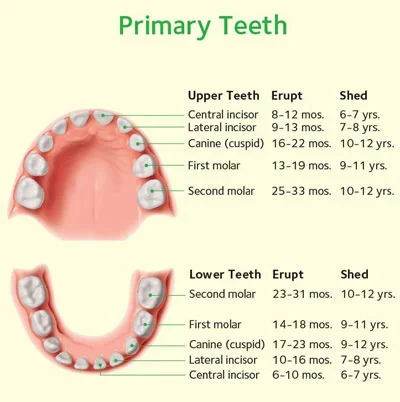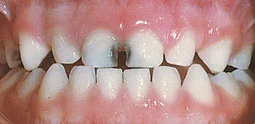- Handling Your Child's Dental Emergency
- Tooth Decay in Baby Teeth
- Your Child's Teeth
- Healthy Smiles for Mother and Baby
- Baby Teeth: When They Come In, When They Fall Out
- Your Child's First Visit to the Dentist
- Why Baby Teeth Are Important
- Your Child's Teeth: Ages Six–12
- Your Child's Teeth: From Birth to Age Six
- Your Child's First Dental Visit
The Foundation of a Radiant Smile: Why Baby Teeth Matter
A child’s radiant smile is anchored in the health of their baby teeth, also known as primary teeth. These initial teeth are fundamental to a child’s overall growth and development. They facilitate chewing and speaking and reserve space in the jaw for the adult teeth that will emerge as they grow.

Teething Timeline and Development
Babies are born without teeth, and the process of teething usually begins around the time they reach six months of age. When your child turns three years old, they typically have 20 primary teeth, including incisors, canines, and molars. Although the timing can vary, the chart below outlines these teeth's general eruption and shedding patterns.
Decay in baby teeth

The Importance of Early Dental Care
Tooth decay can start when the first baby tooth emerges, making early dental care crucial. Neglecting to care for these teeth can lead to pain, infection, and eating, sleeping, and learning difficulties. Decay-causing bacteria are commonly transferred from caregivers to babies, making regular brushing essential to maintain oral health.
Understanding Tooth Decay
Decay-causing bacteria adhere to baby teeth and use sugars from foods and drinks to produce acids. These acids can attack teeth for up to 20 minutes after eating or drinking, eventually damaging enamel and leading to cavities. Frequent exposure to sugary foods and beverages, especially when a child falls asleep with a bottle, increases the risk of decay. For better oral health, offer plain water in a bottle or sippy cup during the day and avoid sugary liquids before bedtime.
When to Start Dental Visits
The American Dental Association and the American Academy of Pediatric Dentistry recommend that children have their first dental visit as soon as their first tooth erupts but no later than their first birthday. Early visits allow the dentist to guide you on effective brushing techniques, discuss feeding habits, and recommend suitable dental care products. Establishing a dental home early on ensures that your child receives consistent, personalized care. A dentist can also assess fluoride needs, examine for early signs of decay, and address issues like thumb-sucking. Preventive treatments such as fluoride applications and dental sealants can significantly reduce the risk of cavities.
Creating a Positive Dental Experience
To set the stage for a lifetime of good oral health, make your child’s first dental visit a positive experience. Schedule the appointment before your child’s first birthday and try to choose a morning time when they are typically more cooperative. Avoid expressing anxiety about dental visits, and never use the visit as a punishment or threat. Instead, approach the visit as an exciting outing that contributes to their well-being. Teaching and reinforcing good oral hygiene habits early can pave the way for a future of solid and healthy teeth.
Final Thoughts
Ensuring the health of your child’s baby teeth is vital for their overall development and future dental health. By following these guidelines and fostering a positive attitude toward dental care, you help lay the groundwork for a bright, healthy smile that will last a lifetime.
Visit Our Office
Office Hours
- MON8:30 am - 5:00 pm
- TUE8:30 am - 5:00 pm
- WEDClosed
- THUClosed
- FRI8:30 am - 5:00 pm
- SAT9:00 am - 2:00 pm
- SUNClosed